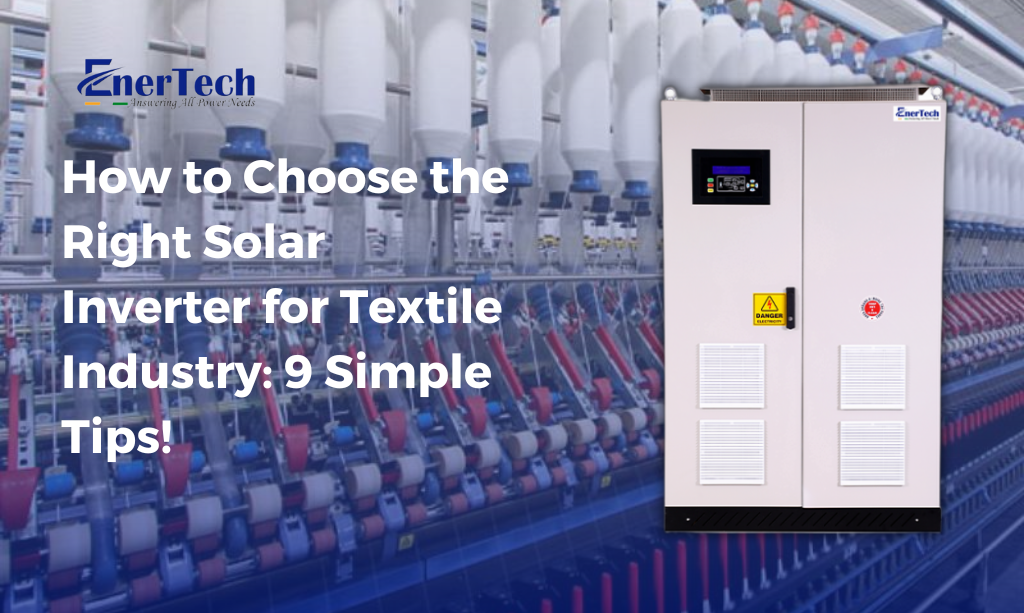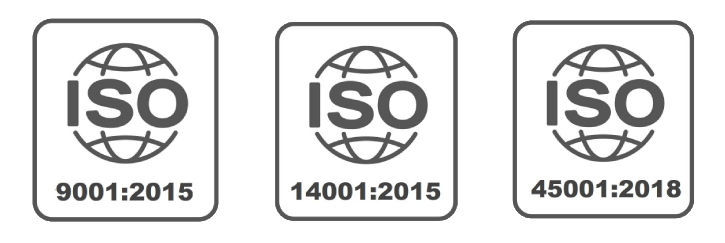Are you a textile manufacturing company owner struggling with rising electricity usage and costs? As part of an ever-growing industry, we understand the challenges you must be encountering while running your production unit. Solar energy can help address the problem. However, solar energy systems are an assembly of various elements integrated to form a single unit. Solar inverters are one of them that help optimize the use of solar energy and reduce your dependence on conventional electricity in the long run. Hence, the choice of the solar inverter for textile industry also matters. So, here are some tips to choose the best-suited one.
What is a Solar Inverter?
A solar inverter is part of a solar power assembly. It converts the direct current (DC) generated by solar panels into alternating current (AC) electricity. The latter is used to power household appliances and fed into the electrical grid.
Selecting the Right Solar Inverter for Textile Industry – 9 Factors to Consider
As a critical component of every solar power system, your choice of solar inverters can significantly impact your energy endeavors. So, here’s how to choose one
1. Energy Requirements
At the outset, calculate your average and peak energy consumption. Evaluate your past electricity use and bills and identify your energy usage patterns. Furthermore, identify the load types and how they are distributed across various times during a particular production day.
2. Solar System Size
Once you’ve decided on your energy need, move to calculating the size or capacity of the solar system you need. The size is usually expressed in kilowatts (kW) or megawatts (MW). Additionally, assess the total space you have to install the solar panels on your rooftop or the ground.
3. Inverter Types and Features
Solar inverters come in different types, including string, central, and microinverters String Inverters suit small to medium-sized installations with consistent sunlight exposure. On the other hand, central inverters are ideal for bigger installations given their higher efficiency and ease of maintenance. The third type is microinverters that are well aligned with installation with shading concerns or complex roof structures, enabling clothes and fabric manufacturer owners to optimize at the panel level.
4. Technical Considerations
In addition to the above, you must ensure that the inverter matches the voltage and frequency needs of your textile unit’s electrical system. Additionally, select MPPT solar inverter to fetch maximum energy from the solar panels. Furthermore, see if the inverter is anti-islanding, overvoltage protection, and short-circuit protection.
5. Scalability and Integrations
Your energy needs may increase with time. To serve your evolving and rising energy needs, check if the inverter you’ve shortlisted also allows for seamless expansion of the solar system and offers flexibility. Moreover, if you intend to add battery storage, ensure the inverter is compatible with energy storage systems.
6. Monitoring
One of the most vital aspects of solar energy inverters is that they allow you to monitor energy production, potential concerns, and system performance through real-time data. It helps you evaluate if the solar system is delivering the expected output. Choose an inverter that enables you to monitor the data seamlessly and accurately so that you make an informed decision while using it.
7. Maintenance
Partner with solar inverter manufacturers in India that offer comprehensive maintenance support and warranties. Choose manufacturers and inverters that offer longer warranty periods that usually increase reliability.
8. Solar Inverter for Textile Industry Price
Price should be a crucial and careful consideration. Crucial is understood but what do we mean by careful? It involves assessing the initial cost of the inverter against its long-term benefits like energy savings, maintenance costs, potential subsidies, and incentives.
Additionally, Solar inverter for textile industry price is based on the total cost of ownership which includes operation maintenance and installation charges. It will help you calculate your total energy costs after installing the solar energy system and how much you’ve saved by doing that.
9. Compliance
Make sure that the inverter is compliant with various national and international standards and regulations. Additionally, look for certifications like CE, IEC, and ISO to stay assured about its quality and safety standards.
EnerTech’s Efficient Solar Inverters for Textile Industry!
Now that you know how to choose a solar inverter for textiles, choose EnerTech’s solar inverters. We are among the best solar inverter manufacturers & supplier in India that endeavor to revolutionize the textile industry’s energy scenario.
Our solar inverters are equipped with competent features and functionalities. While being efficient, they also comply with the international and national standards. Click to explore our solar inverters and email us at sales@enertechups.com to navigate the capabilities of our reliable solar inverter for the textile industry in India.
Tags: Solar Inverter for textile, Solar inverter for textile industry price, Solar inverter for textile industry in india, solar inverter manufacturers in india, solar inverter for clothing business, solar inverter for fabric industry,




